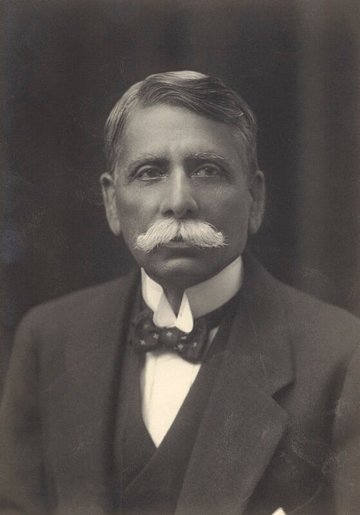
Syed Ameer Ali
‐
Lawyer, social reformer and scholar
Other names
Saiyid Ameer Ali
Sayyid Ameer Ali
Rt Hon Ameer Ali
Place of birth
Date of arrival to Britain
Location(s)
RH12 3AS
United Kingdom
Place of death
Pollingfold Manor, near Rudgwick, Sussex
Date of time spent in Britain
1869–73, 1875, 1877, 1879–80, 1884, 1895, 1904–28
About
Syed Ameer Ali was a lawyer, a judge, a political and social reformer and a scholar of Islam. He wrote a number of books on Islamic law. He first arrived in the UK in 1869, initially to compete for the Indian Civil Service. He was friends with the Fawcetts and attended female suffrage meetings in 1870. He was called to the Bar through the Inner Temple and returned to India to serve in the Calcutta High Court.
Syed Ameer Ali made frequent returns to Britain after 1873. In 1880 he met James Knowles, editor of the Nineteenth Century, and thereafter wrote a number of articles for the journal. On another visit back to the UK, he married Isabelle Konstam.
Syed Ameer Ali retired in 1904 and settled in the UK. His first task was to launch the London Muslim League (1908) and he took up the issue of Muslim representation. However, he resigned from the Muslim League in 1913, regarding it as too extreme. In 1910 he launched a project to build a mosque in London, and in 1911 he formed the British Red Crescent Society because the British Red Cross was not helping Turks and Arabs injured in Italian attacks, thereby addressing the need for an independent society to help the sick and wounded irrespective of race or religion. In 1909 he was appointed to the Privy Council, the first Indian member on the Council.
He died on 3 August 1928 at his home, Pollingfold Manor, near Rudgwick, Sussex and was buried in Brockwood Cemetery, Surrey. He had two sons who both studied at Oxford and both eventually retired to settle in Britain with their British wives.
Festival of Empire, 1911
Torick Ameer Ali (son), John Bryce, Henry Fawcett, Millicent Fawcett, Lord Hobhouse, James Knowles (editor of Nineteenth Century), Dadabhai Naoroji, Lord Northbrook, Oscar Wilde.
A Critical Examination of the Life and Teachings of Mohammed (London: Williams & Norgate, 1873)
The Personal Law of the Mahommedans (London: W. H. Allen, 1880)
The Life and Teachings of Mohammed, or the Spirit of Islam (London: W. H. Allen & Co., 1891)
Mahommedan Law (Calcutta: Thacker, Spink, 1892)
Students’ Handbook of Mahommedan Law (Calcutta: Thacker, Spink & Co., 1892)
The Ethics of Islam (Calcutta: Thacker & Spink, 1893)
A Short History of the Saracens (London: Macmillan, 1899)
Islam (London: Archibald Constable & Co., 1906)
The Legal Position of Women in Islam (London: Hodder & Stoughton, 1912)
Persian Culture (London: Pub. for the [Persia] Society by John Hogg, 1913)
Ansari, Humayun, 'The Infidel Within': Muslims in Britain since 1800 (London: Hurst & Co., 2004)
Aziz, K. K., Ameer Ali: His Life and Work (Lahore: Publishers United, 1968)
FitzGerald, S. V., ‘Ameer Ali, Saiyid (1849–1928)’, rev. Roger T. Stearn, Oxford Dictionary of National Biography (Oxford University Press, 2008) [http://www.oxforddnb.com/view/article/30400]
Visram, Rozina, Asians in Britain: 400 Years of History (London: Pluto Press, 2002)
Wasti, Syed Razi (ed.) Memoirs and Other Writings of Syed Ameer Ali (Lahore: People’s Publishing House, 1968)
Private papers in possession of family
Image credit
Saiyid Ameer Ali by Walter Stoneman, bromide print, 1917, NPG x67935
© National Portrait Gallery, London, Creative Commons, http://creativecommons.org/licenses/by-nc-nd/3.0/
